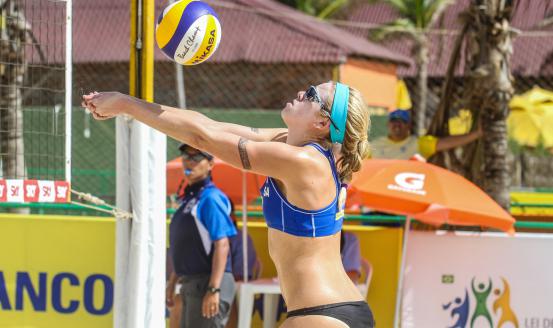- Commissioner’s statement on Ventura, Marte
- Ronnie O’Sullivan: Masters champion ‘felt so vulnerable’ in final
- Arron Fletcher Wins 2017 WSOP International Circuit Marrakech Main Event ($140,224)
- Smith challenges Warner to go big in India
- Moncada No. 1 on MLB Pipeline’s Top 10 2B Prospects list
- Braves land 2 on MLB Pipeline’s Top 10 2B Prospects list
- Kingery makes MLB Pipeline’s Top 10 2B Prospects list
- New Zealand wrap up 2-0 after Bangladesh implosion
- Mathews, Pradeep, Gunathilaka to return to Sri Lanka
- Elliott hopes for rain for Poli
Fortaleza has 29 final 4 finishers from FIVB Age Group World Championships
- Updated: April 28, 2016

Fortaleza, Brazil, April 28, 2016 — Led by one member of each gender’s top-seeded teams, nearly 30 athletes competing in this week’s FIVB Fortaleza Open in Brazil have earned their spots in the FIVB Beach Volleyball World Tour by way of the FIVB proving grounds known as the FIVB Age Group World Championships.Based in Lausanne, Switzerland, the Fédération Internationale de Volleyball (FIVB) sanctions and produces four FIVB Age Group World Championships for U-23, U-21, U-19 and U-17. Out of these celebrations of the best young beach volleyball players in the world come many of today’s stars on the FIVB Beach Volleyball World Tour.The FIVB has scheduled two age group world championships this Olympic year. The FIVB U-21 World Championships will be held in Lucerne, Switzerland on May 11-16 and the FIVB U-19 World Championships will be held in Larnaka, Cyprus on July 26-31.FORTALEZA SCHEDULEThe FIVB Fortaleza Open is a double-gender event with 31 main draw teams for men and 28 for women. For the men, a qualification tournament on Tuesday was held to determine the final spot in the main draw followed by two days of round robin pool play. The top three teams in the eight pools (24 total teams) advanced from pool play to the single-elimination knockout rounds. Women began their pool play on Thursday and conclude on Friday. Also on Friday, women will play their first two elimination rounds.On Saturday, the quarterfinals and semifinals for both genders will be played. The medal matches for both genders will all be played on Sunday with the awarding ceremony following the last gold medal match concluding the event.FIVB U-21 TEAMOne of the teams entered in the Lucerne champions are Brazilians playing with different partners here in Fortaleza. Both just 17 years old, Eduarda Lisboa will reunite with Ana Patricia Ramos, the pair that won the gold medal at the inaugural Beijing 2014 Youth Olympic Games. In Fortaleza, Eduarda is playing with Elize Maia, the duo that won the gold medal at this year’s FIVB Maceio Open in Brazil. Ana Patricia is teamed in Fortaleza with Carolina Horta.POIGNANT PURPOSEThe competitions were designed to develop young athletes as well as give them platforms to help reach the pinnacle of the sport on the FIVB World Tour. For some, like Brazil’s Pedro Salgado and Brazil’s Barbara Seixas, the age group world championships have not only helped lead to prominent places on the FIVB World Tour, but for both of them also to spots for their teams in the upcoming Rio 2016 Olympic Games. Seixas and her teammate Agatha Bednarczuk also won the 2015 FIVB World Championships held at four dynamic venues in the Netherlands last June and early July. Pedro’s Olympic teammate is Evandro Goncalves.29 FINAL FOURSOf the 59 two-person tandems competing in Fortaleza this week, 15 men and 14 women (29 total) have had at least one final four finish in a FIVB Age-Group World Championship. Included in that group are six men who have won eight gold medals and 11 women who have won 17 gold medals.Brazil’s Pedro leads all the men in Fortaleza with six final four finishes in FIVB Age Group World Championships, including three gold medals, one silver, one bronze and one fourth place finish. Brazil’s Barbara leads the women in Fortaleza with five final four finishes in these very special developmental tournaments, including three gold medals and two silver medals. Brazil’s Pedro’s three gold medals were won in the 2002 FIVB U-19 World Championships in Xylokastro, Greece (with Ian Borges) and the other two in 2003 FIVB U-21 World Championships in Saint Quay Portrieux, France (with Pedro Cunha) and again in 2006 in Myslowice, Poland (with Bruno Oscar Schmidt).Brazil’s Barbara earned her three gold medals starting at the 2005 FIVB U-19 World Championships in Saint Quay Portriex, France and the other two in the 2006 FIVB U-21 World Championships in Myslowice, Poland (with Carolina Aragao) and again in 2007 in Modena, Italy (with Liliane Maestrini). ONLY 17Another prominent example of the benefits of competing in the FIVB Age Group World Championships, …
continue reading in source www.fivb.org
